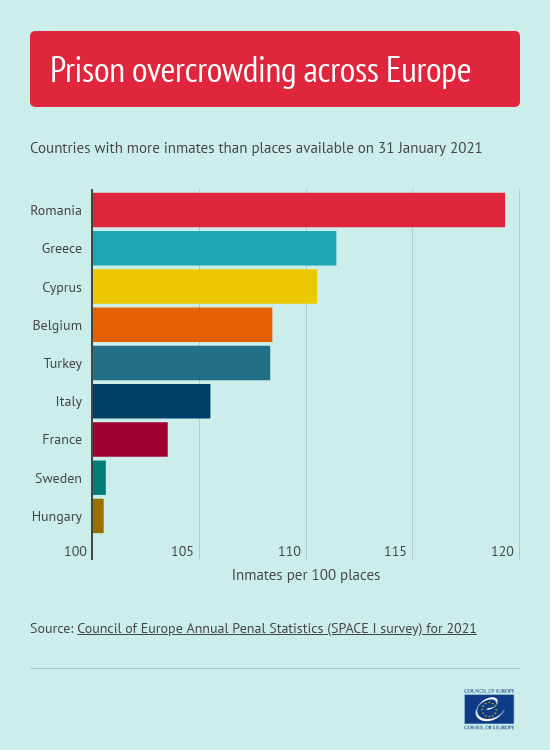Belgium's prisons are so overcrowded they have made it into the top 5 ranking of Europe's most densely populated jails, narrowly beating Turkey.
As a result of release schemes adopted in certain countries to curb the spread of Covid-19 among detainees, the pandemic contributed to the reduction of overall prison populations in Europe between January 2020 and 2021, according to the Council of Europe (COE)’s Annual Penal Statistics on Prison Populations for 2021.
The Belgium Government decided to suspend sentencing and decided to go as far as pushing for early provisional release for prisoners who were less than six months from the end of their sentences to keep the prison population under control in April 2020. An adapted system was later included in the law.
However, despite these measures, the age-old issue of overcrowded prisons in Belgium has not been alleviated, and overcrowding remains an issue. Belgium recorded a prison density of 108 inmates per 100 places, according to the COE's report. Only Romania (119) and Greece and Cyprus (both 111) ranked higher.

Overcrowding in prisons. Credit: Council of Europe
For several years, the population in Belgian jails exceeded 10,000, despite there was only being room for about 9,300 inmates in the country's 35 penitentiary institutions. This resulted in inmates being forced to sleep on a mattress on the floor in several detention centres and prisons.
The recent SKY-ECC case resulted in the prison population increasing even further, as more than 500 people were arrested and 240 more suspects are in pre-trial detention as a result of the investigation.
Measures to curb overcrowding
In light of the chronic overcrowding in prisons, Belgium in the 1970s introduced measures that resulted in sentences under three years automatically being converted to electronic surveillance and sentences of under six months not being executed at all.
However, rather than reducing overcrowding in prisons, it exacerbated Belgium’s high prison density and its very high recidivism rate, according to Federal Minister for Justice Vincent Van Quickenborne, who stated first-time offenders "often imagine themselves to be untouchable."
Last week, Van Quickenborne announced the purchase of eight detention houses to ensure those with short prison sentences are jailed. "If we want to put an end to impunity, in the long term, to the overcrowding in prisons, then all sentences must be carried out."
Related News
- Berkendael women's prison to be converted into detention centre
- League for Human Rights calls for cuts in prisoner numbers
In February, the minister also announced that 800 additional places will be created in Belgian prisons in 2022 and 2023, including in transition centres and detention centres, while at least 300 in the prisons of Saint-Gilles and Dendermonde. These come on top of the 720 spots provided in detention houses for carrying out short sentences.
“The overcrowding in our prisons is an old problem” Van Quickenborne said in a statement at the time.
Situation in European prisons
Overall in Europe, there was a decline in the rate of imprisonment. In the 48 European prison administrations for which information was available for both 2020 and 2021, the prison administration rate fell from 104.3 to 101.9 inmates per 100,000 inhabitants (-2.3%).
“The decrease in these indicators could be an indirect consequence of the lockdowns, which decreased street crime," Professor Marcelo Aebi, Head of the SPACE research team from the University of Lausanne, stated.
"The drop in the rate of admissions into prisons was also particularly steep in 2020, corroborating the influence of the restrictions of movement related to Covid-19. Fewer interactions between people implies less crime in public spaces, fewer arrests and individuals placed in detention."

